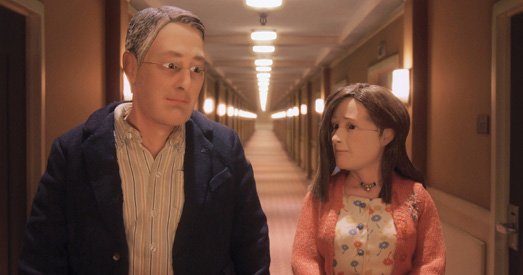Anomalisa
Posted on January 7, 2016 at 5:39 pm
B+| Lowest Recommended Age: | Adult |
| MPAA Rating: | Rated R for strong sexual content, graphic nudity and language |
| Profanity: | Very strong and explicit language |
| Alcohol/ Drugs: | Drinking |
| Violence/ Scariness: | Peril and unhappiness |
| Diversity Issues: | None |
| Date Released to Theaters: | January 8, 2016 |
The “Fregoli delusion” sometimes called the delusion of doubles, is a rare disorder that makes people believe that everyone else in the world is in fact a single person who changes appearance or is in disguise. When Michael Stone (David Thewlis) checks into the Fregoli hotel in this stop-motion animated film from Charlie Kaufman (“Being John Malkovich,” “Adaptation,””Eternal Sunshine of the Spotless Mind”), we begin to understand why it is that everyone else we have seen in the film’s first few moments including the passenger sitting next to Stone on the airplane and his cab driver, have the same face and voice (Tom Noonan).

Even his wife and child speak with Noonan’s voice.
Michael checks into the hotel on a business trip. He will be the speaker at a conference on customer service. He has written an acclaimed book on the subject. He teaches customer service representatives, the subject of near-universal frustration and derision. He tells them “Each person you speak to has had a day.” He tries tell them to be aware of what is special about each individual, but around him everyone seems the same. And Michael himself, as he speaks of humanity, is, well, a puppet. Literally. This stop-motion animated film is remarkably realistic with one of the most authentically awkward sex scenes in cinema history. But the figures themselves, expressive as they are and fluid in their movements, are frankly artificial, with clear breaks on their faces at eye level so we can see how the various face parts get swapped in and out to create emotions.
Michael calls a former girlfriend and they meet for a painfully clumsy conversation. And then he happens upon two other hotel guests, women who are in town for the conference and looking forward to hearing him speak. One is Lisa (Jennifer Jason Leigh), a shy woman, self-conscious about a scar on her face, and often second-guessing herself or making self-deprecating comments that anticipate being judged a failure or a bother by those around her.
She thinks that if he is going to make a pass at anyone, it will be her friend, and clearly the friend (who, like everyone else, has the voice of Tom Noonan), does, too. But it is Lisa Michael invites back to his room. She is an anomaly, he tells her. Something about her voice. Anomaly. Lisa. Anomalisa.
The film is beautifully designed. Michael’s hotel room and the hotel bar are masterpieces of bland and yet somehow sinister anonymity. An encounter with a hotel employee who has an office so enormous it must be traversed by golf cart is reminiscent of the daffy between-floors half-level ceilinged office in “Being John Malkovich.” Any writer is in a sense a puppetmaster, and we have seen Kaufman’s fascination with puppets before; in “Being John Malkovich,” John Cusack’s character was a puppeteer and the various characters in essence used actor John Malkovich (playing a version of himself) as a puppet when they took over his consciousness. In “Synecdoche, New York,” Philip Seymour Hoffman’s character was a playwright trying to maintain control over an increasingly uncontrollable narrative. Here the puppets give Kaufman the greatest possible control over the way the story appears and the way it is told. Stop-motion is so exacting that only seconds of footage are completed each day and the sex scene alone took six months to complete. It also allows him to explore issues of memory, identity, imagination, and loneliness. Dream-like images demonstrate through both illustration and contrast the reality behind the platitudes in Michael’s speech. Just as a raw and needy reality keeps bursting through his remarks, the anguish and hopelessness he feels — and the fear and hopefulness that Lisa feels — transcend the plastic pieces of the dolls who are, it must be said, acting.
For a brief moment, it seems Michael has found something extraordinary. But when he tries to find a way to stay with her, the Fregoli syndrome — or maybe just his terror of genuine intimacy — kicks in. By that time, our own connection to these characters, as artificial as they appear, or, perhaps because of the oddness of their artificiality, is surprisingly warm and intimate.
Parents should know that this film includes very explicit sexual situations and frontal male (puppet) nudity, very strong and explicit language, drinking, and adultery.
Family discussion: What does the name of the hotel tell us about the story? Why did Lisa’s voice change?
If you like this, try: “Being John Malkovich” and “Adaptation” by the same screenwriter

